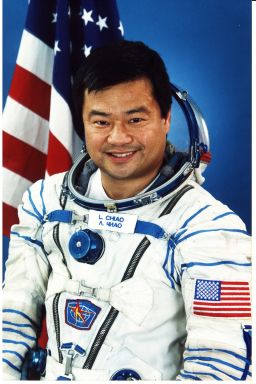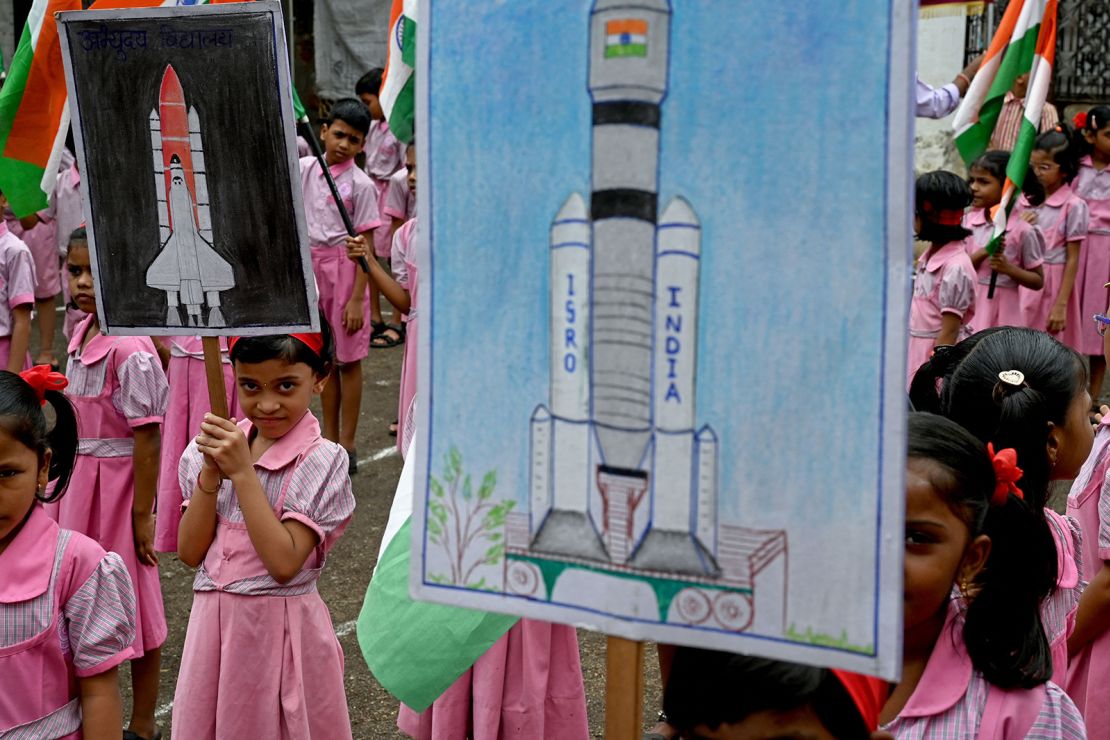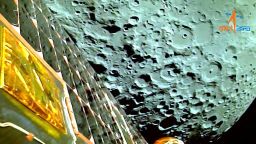Editor’s Note: Leroy Chiao, PhD, works as a consultant, and is the CEO and co-founder of One Orbit LLC, a motivational training, education and talent management company. He served as a NASA astronaut from 1990-2005 and flew four missions into space aboard three Space Shuttles – and once as the copilot of a Russian Soyuz spacecraft to the International Space Station, where he served as the commander during Expedition 10. The views expressed in this commentary are his own. Read more opinion at CNN.
There are many reasons why nations create and continue civil space programs. Some hope to advance their civilian efforts in science and technology, others seek to expand their technical workforce, and still others are seeking a way to motivate the next generation of young workers.

Since the dawn of the space race however, the biggest motivation by far has been enhancing the sense of national prestige, at home and internationally.
That’s a big part of what’s driving India, which on Wednesday became only the fourth nation to successfully soft-land a probe on the Moon.
The milestone marks a huge accomplishment for its nascent space program, which has made steady progress over the years. I expect future success to follow: Delhi has shown it is committed to making significant investments in space exploration efforts.
At the dawn of the space age, the Soviet Union, which understood only too well how a successful space program could bolster its standing on the national stage, struck first with the launch of Sputnik, the first satellite in 1957.
Although it transmitted only a simple beeping signal, the implications of the launch were huge; the Soviet Union could now strike its enemies, including the United States, with nuclear missiles. Moscow followed that breakthrough with others, including the first animal in orbit (the dog Laika in 1957) and the first human in space (Yuri Gagarin in 1961).
As Russia notched success after success in space, America was in a near panic. Although the US followed with our own successes, the early impression was that we trailed the Soviets technologically. That’s why President John F. Kennedy’s call to land American astronauts on the Moon resonated so profoundly for our nation, garnering enthusiastic support from both Democrats and Republicans in Congress, as well as with the American public more broadly.
The race to space was seen as being almost as a war of survival, one which we could not afford to lose.
Russian President Vladimir Putin is the latest in a long line of leaders to attempt to use a successful space venture to reflect his nation’s greatness. Putin had hoped this week to bask in the glow of a successful landing of the Russian Luna-25 moon lander.
For extra effect, the Russian president — badly in need of a national prestige win — timed the lunar mission to take place just days ahead of a voyage to the Moon by the rival Indian vehicle, the Chandrayaan-3 spacecraft.
Russia won the race but lost the game: A malfunction caused Luna-25 to crash instead of soft-land on the lunar surface. Had it been successful, Luna-25 doubtless would have been touted as “proof” that Russia was still a great nation, despite its setbacks in its disastrous war in Ukraine. (This type of mission is especially difficult because the orbit change maneauvers to land at one of the poles have to be done precisely).
If these space programs are mirrors of greatness for nations, then it is interesting to more closely examine them. On the rise are the programs of Asia, most notably China and India. Both countries have developed sophisticated cryogenic rocket engines, launchers and spacecraft. Both operate several constellations of satellites for communication, Earth imaging and remote sensing, and China has its own navigation satellite constellation.
China also boasts a human spaceflight program with an operational space station, including crew and cargo transport spacecraft. India has plans to send its own astronauts into orbit in the next few years, while China has announced plans to send its astronauts to the lunar surface in the 2030s.
China’s lunar rover is still actively exploring the far side of the Moon, the only country so far to have placed a lander there.

In the International Space Station (ISS) partnership, the US, Europe, Japan and Canada also continue to move forward with space exploration. After years of delay and cost overruns, the Artemis I mission was finally launched last year and NASA has named the Artemis II crew which includes a Canadian astronaut. NASA plans to return humans to the Moon in the coming years, something that hasn’t happened since the last Apollo landing in 1972.
These countries also continue to launch satellites and other spacecraft. NASA continues, meanwhile, to operate rovers on Mars. And one of the most exciting developments in the West are the partnerships between commercial space companies and NASA.
SpaceX has been a NASA partner for many years, sending supplies and crew to the ISS. They are also developing a lunar lander for NASA, as is a team led by billionaire Jeff Bezos’ Blue Origin. Several smaller companies are participating in contracts to provide spacecraft and services for lunar exploration, in what is proving to be a relentless forward push into space on multiple fronts.
Russia is the one exception. Instead of expanding, its space program has been in decline for several years. The once-great program began disintegrating after the fall of the Soviet Union and the downward spiral now appears to be accelerating. Cosmonaut Sergei Krikalev was stranded on the Mir space station for nearly a year because of the collapse of the Soviet Union and immediate chaos that followed.
Their program was arguably saved by the US, which supported the Mir space station and brought Russia into what became the ISS program, with cash for services and contracts to produce the core modules and other equipment.
Make no mistake, Russia has also been a key partner in the ISS program. They have provided crew and cargo transportation (including for my crew during Expedition-10), while the Space Shuttle was grounded after the Columbia accident.
Get our free weekly newsletter
Until recently, Russian rockets and spacecraft were among the most safe and reliable. But now the future of Russia’s space program is in doubt, amid continuing funding cuts, allegations of corruption (for example, the scandals related to the building of the Vostochny launch complex), politicization (for instance the reign of former Roscosmos director, career-politician Dmitry Rogozin), and the lack of young professionals in their pipeline (the low-paying jobs are not attractive to prospective workers.)
In recent years, Russia has seen failures of Soyuz and Progress spacecraft and launchers, including the 2018 launch abort of Soyuz MS-10 which had US astronaut Nick Hague onboard. Luna-25 is just the latest in a string of failures. Thankfully, none of these has yet resulted in any deaths or injuries.
Russia’s bedraggled space program mirrors the state of the nation itself, including the surprisingly poor performance of the Russian military in its war on Ukraine. Instead of making his nation a “great power” again, Putin has shown the world just how badly Russia is in decline.
The lamentable state of Moscow’s space program is just the latest confirmation of that.





